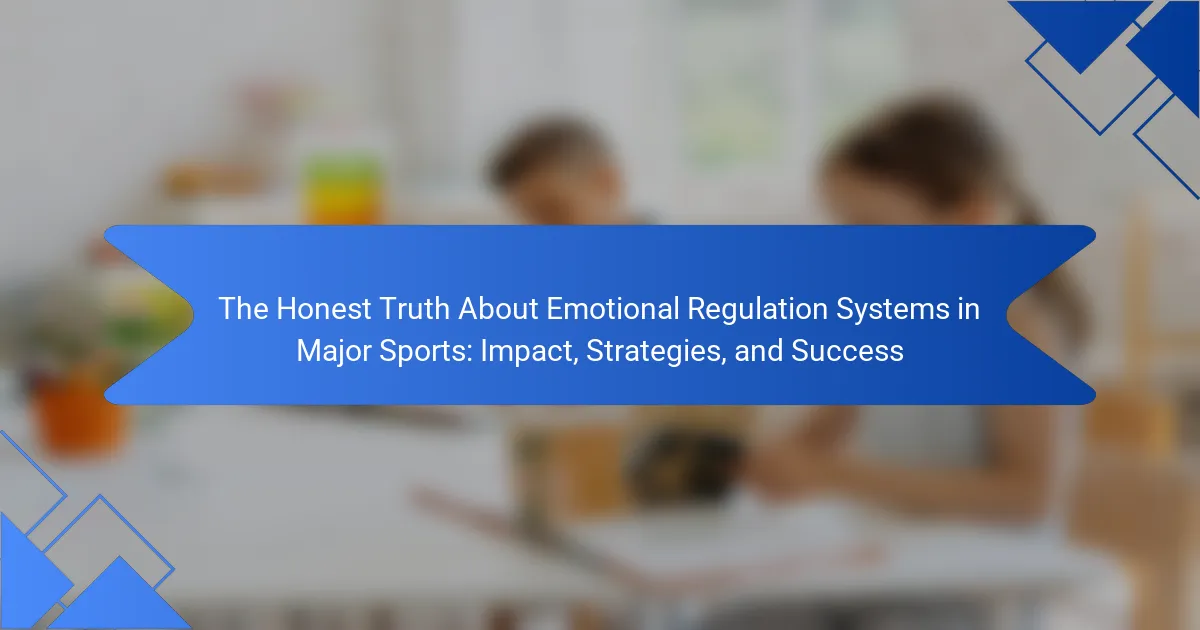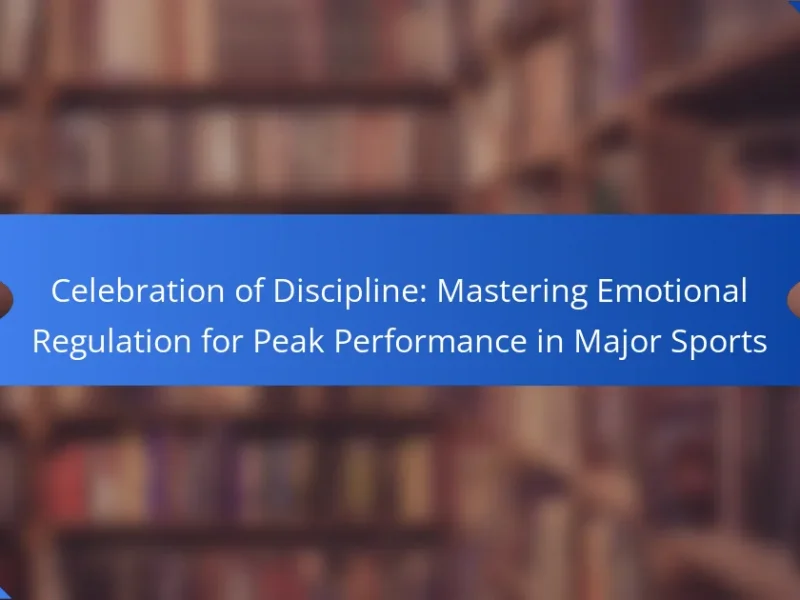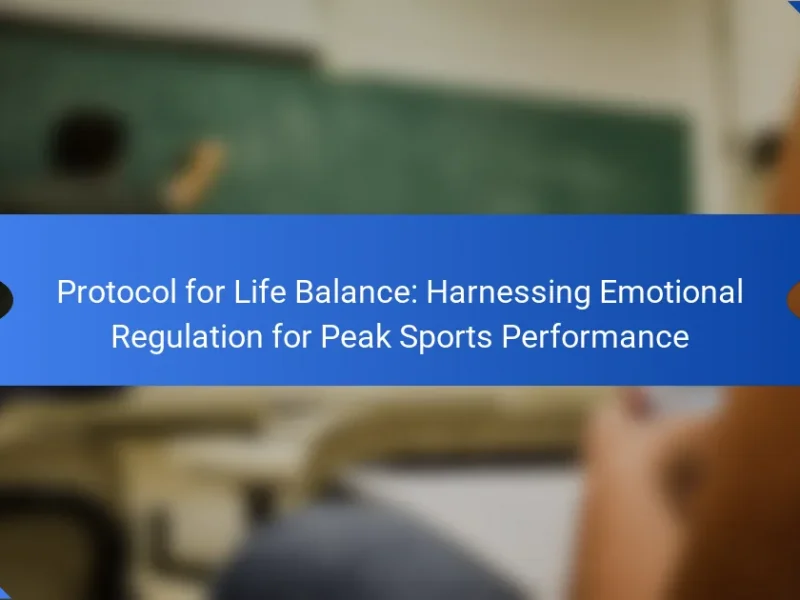Emotional regulation systems are crucial for enhancing athlete performance and mental resilience in major sports. This article explores the impact of these systems, effective strategies like mindfulness and cognitive restructuring, and success stories demonstrating their benefits. Additionally, it examines challenges athletes face and the role of coaches in fostering emotional regulation skills. Understanding these elements can lead to improved focus and reduced anxiety in competitive environments.
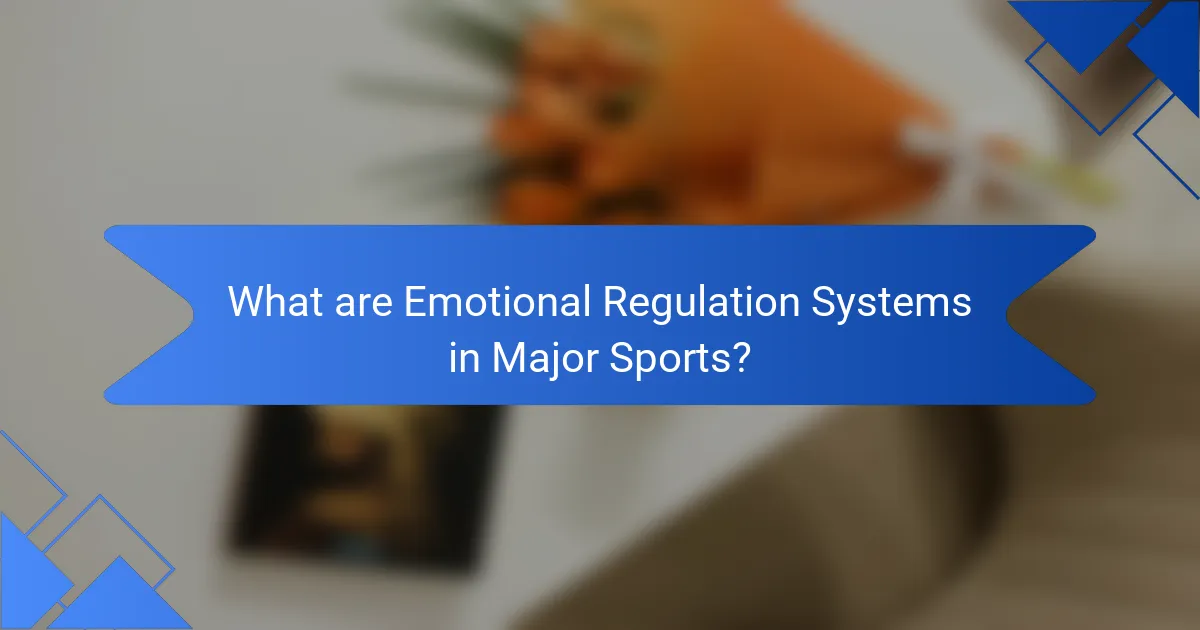
What are Emotional Regulation Systems in Major Sports?
Emotional regulation systems in major sports are essential for athlete performance and mental resilience. These systems help athletes manage emotions, reduce stress, and maintain focus during competition. Effective strategies include mindfulness practices, cognitive restructuring, and emotional awareness training. Research indicates that athletes who utilize these systems experience improved performance and reduced anxiety levels. Success stories from various sports demonstrate the positive impact of emotional regulation on both individual and team outcomes.
How do these systems influence athlete performance?
Emotional regulation systems significantly enhance athlete performance by improving focus, resilience, and stress management. These systems enable athletes to maintain optimal emotional states during competition. For instance, athletes who effectively manage anxiety demonstrate better decision-making and execution under pressure. Research indicates that emotional regulation correlates with higher performance metrics, such as improved reaction times and consistency in skill execution. As a result, integrating emotional regulation strategies into training can lead to measurable success in sports.
What role does emotional intelligence play in sports?
Emotional intelligence significantly enhances performance in sports by improving athletes’ emotional regulation. It allows athletes to manage stress, maintain focus, and foster teamwork. High emotional intelligence correlates with better decision-making under pressure, leading to improved outcomes. Strategies such as mindfulness training and emotional awareness exercises can cultivate these skills, contributing to overall success in major sports.
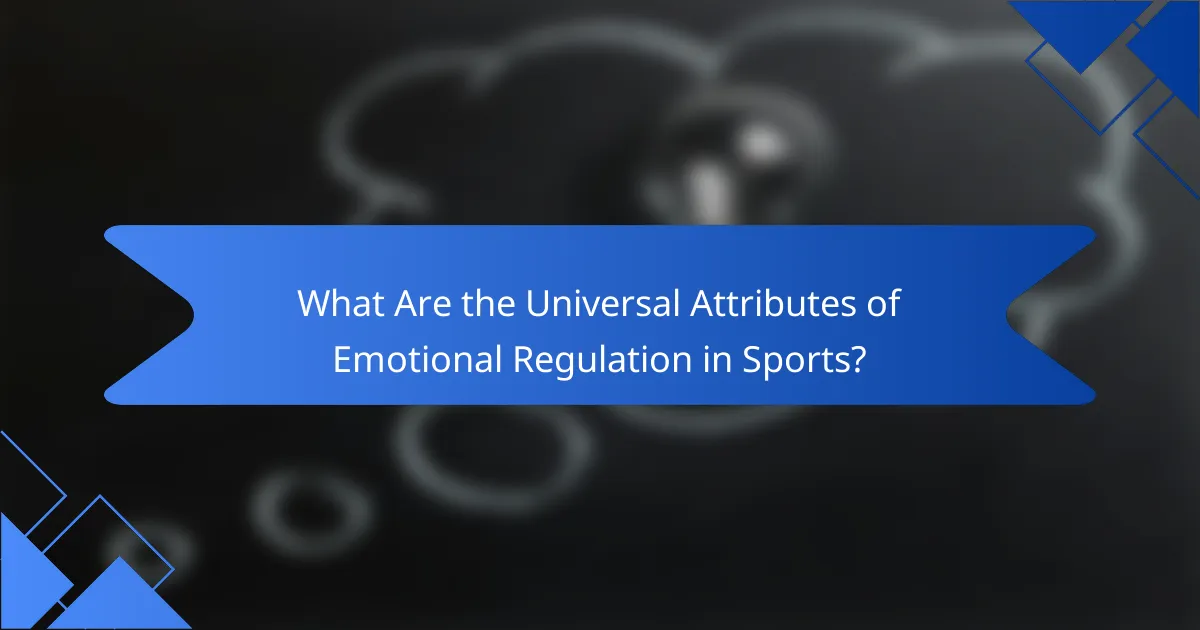
What are the universal attributes of emotional regulation in sports?
Emotional regulation in sports universally involves managing emotions to enhance performance. Key attributes include awareness of emotions, coping strategies, and the impact on decision-making. Each athlete’s ability to regulate emotions can significantly influence their success and resilience in competition. Developing these skills leads to improved focus and reduced anxiety, ultimately fostering better performance outcomes.
How do athletes typically manage their emotions?
Athletes manage their emotions through structured emotional regulation strategies. These strategies include mindfulness practices, cognitive reframing, and routine development. Mindfulness helps athletes stay present and reduce anxiety. Cognitive reframing allows them to reinterpret negative thoughts positively. Establishing routines fosters a sense of control and predictability, enhancing performance under pressure.
What common techniques are used across various sports?
Emotional regulation techniques are common across various sports to enhance performance. Key methods include mindfulness training, cognitive restructuring, and visualization. These strategies help athletes manage stress, improve focus, and maintain composure during competition. For example, mindfulness practices enable athletes to stay present, while cognitive restructuring allows them to reframe negative thoughts. Visualization techniques enhance confidence and prepare athletes mentally for performance.
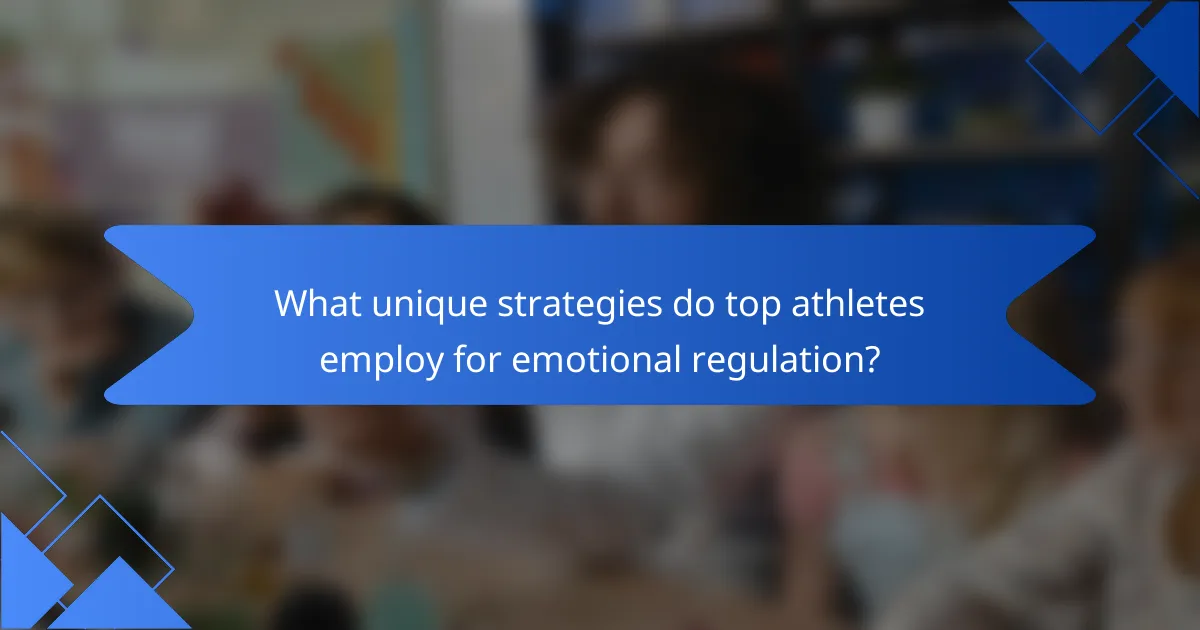
What unique strategies do top athletes employ for emotional regulation?
Top athletes employ unique strategies for emotional regulation, including mindfulness, visualization, and routine development. Mindfulness helps athletes stay present, reducing anxiety. Visualization enhances performance by mentally rehearsing successful outcomes. Establishing consistent routines fosters stability and focus, contributing to overall success.
How do elite athletes personalize their emotional regulation approaches?
Elite athletes personalize their emotional regulation approaches by tailoring strategies to their unique psychological needs. They often utilize techniques such as mindfulness, visualization, and cognitive restructuring to enhance focus and manage stress.
Research shows that emotional regulation directly impacts performance outcomes. For instance, athletes who practice mindfulness report lower anxiety levels and improved concentration during competitions.
A unique attribute of elite athletes is their ability to adapt these emotional strategies based on situational demands. They may switch between techniques, like using deep breathing before a high-pressure event and visualization during training sessions.
As a result, personalized emotional regulation systems contribute significantly to an athlete’s overall success, fostering resilience and mental strength in competitive environments.
What are the distinct practices in different sports disciplines?
Different sports disciplines employ distinct emotional regulation practices, impacting athlete performance. For example, team sports often emphasize collective emotional strategies, while individual sports focus on personal techniques. In basketball, players use visualization to enhance focus and manage pressure. Conversely, in tennis, athletes may practice mindfulness to regulate anxiety during matches. These strategies contribute to overall success by fostering resilience and maintaining composure under stress.
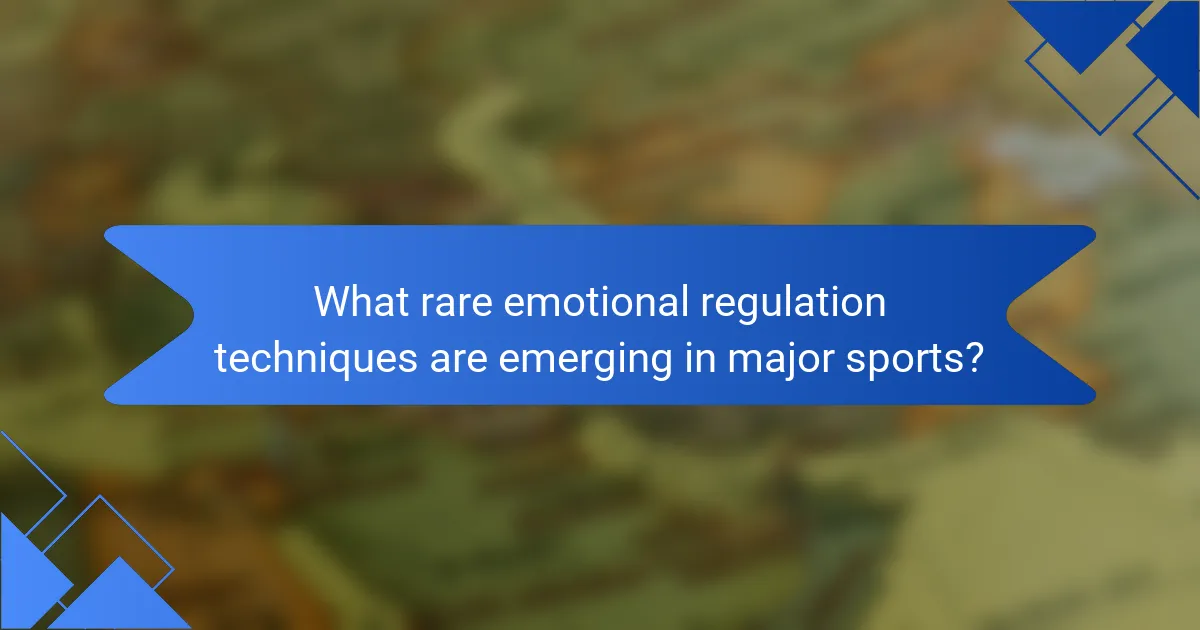
What rare emotional regulation techniques are emerging in major sports?
Emerging rare emotional regulation techniques in major sports include mindfulness-based stress reduction, biofeedback training, and expressive writing. These techniques enhance athletes’ mental resilience and performance under pressure. Mindfulness practices help athletes remain present, reducing anxiety. Biofeedback provides real-time data on physiological responses, allowing for better self-regulation. Expressive writing offers a way to process emotions and improve focus. Each technique is gaining traction as teams recognize the importance of mental health in competitive sports.
What innovative approaches are being researched or implemented?
Innovative approaches in emotional regulation systems for major sports include technology integration, mindfulness training, and data analytics. Teams increasingly use wearable devices to monitor athletes’ physiological responses, enabling personalized interventions. Mindfulness techniques, such as meditation and breathing exercises, are being implemented to enhance focus and emotional control. Additionally, data analytics provide insights on performance trends, helping coaches tailor strategies for emotional resilience. These methods aim to improve athlete well-being and performance consistency.
How do these rare techniques impact overall performance?
Rare techniques in emotional regulation systems significantly enhance overall performance in major sports. These methods foster improved focus, resilience, and adaptability among athletes. For instance, techniques like mindfulness and visualization can lead to better stress management, resulting in more consistent performance under pressure. Furthermore, athletes employing these strategies often report increased self-awareness, allowing for quicker adjustments during competitions. Overall, the integration of rare emotional regulation techniques can be a game-changer in achieving peak performance levels.

What are the challenges athletes face in emotional regulation?
Athletes face significant challenges in emotional regulation, including performance anxiety, emotional exhaustion, and pressure to succeed. These factors can lead to decreased focus and increased stress levels. Emotional regulation strategies, such as mindfulness and cognitive reframing, are essential for managing these challenges effectively. Research indicates that athletes who develop strong emotional regulation skills tend to perform better under pressure and maintain mental well-being.
How do external pressures affect emotional management?
External pressures significantly challenge emotional management in sports. Athletes face stress from competition, media scrutiny, and fan expectations. These pressures can lead to anxiety and affect performance. Effective emotional regulation strategies include mindfulness, cognitive restructuring, and support systems. Research shows that athletes who develop resilience through these strategies often achieve greater success.
What are common pitfalls in emotional regulation for athletes?
Common pitfalls in emotional regulation for athletes include lack of self-awareness, negative self-talk, and poor coping strategies. These issues can hinder performance and lead to burnout. Athletes often struggle to recognize their emotional triggers, which prevents effective regulation. Additionally, negative self-talk can create a cycle of anxiety and decreased confidence. Lastly, relying on unhealthy coping mechanisms, such as withdrawal or aggression, can exacerbate emotional challenges. Addressing these pitfalls is crucial for enhancing emotional resilience and overall performance.

What insights can coaches provide on emotional regulation systems?
Coaches provide valuable insights on emotional regulation systems by identifying effective strategies that enhance athlete performance. They emphasize techniques such as mindfulness and cognitive restructuring to manage emotions. Coaches also monitor emotional responses during training and competitions, fostering resilience. This holistic approach contributes to improved focus and stress management, ultimately leading to greater success in major sports.
How can coaching strategies enhance emotional management?
Coaching strategies significantly enhance emotional management by providing athletes with tools to regulate their emotions effectively. These strategies include techniques such as mindfulness training, cognitive restructuring, and goal-setting, which promote self-awareness and emotional resilience.
Research indicates that athletes who engage in structured emotional regulation training demonstrate improved performance under pressure. For instance, a study found that athletes using mindfulness techniques reported lower anxiety levels and increased focus during competitions.
Moreover, coaching strategies foster a supportive environment where athletes feel safe to express their emotions. This open communication leads to stronger team dynamics and enhances overall performance.
In summary, effective coaching strategies are essential for developing emotional regulation systems in sports, directly impacting athletes’ success and well-being.
What are the best practices for integrating emotional regulation in training?
Integrating emotional regulation in training involves structured approaches that enhance athletes’ mental resilience. Key practices include incorporating mindfulness techniques, developing emotional awareness, and fostering supportive team environments.
Mindfulness techniques help athletes stay present, reducing anxiety and improving focus. Emotional awareness training enables athletes to recognize and manage their feelings effectively. Supportive team environments encourage open communication and peer support, essential for emotional growth.
Regular workshops can reinforce these practices, ensuring athletes consistently apply emotional regulation strategies. Additionally, integrating feedback mechanisms allows for continuous improvement in emotional skills, leading to better performance outcomes.

How can athletes optimize their emotional regulation for success?
Athletes can optimize emotional regulation by employing mindfulness techniques, cognitive restructuring, and goal-setting strategies. Mindfulness enhances awareness of emotions, allowing for better control during competition. Cognitive restructuring helps athletes reframe negative thoughts, promoting resilience. Goal-setting provides clear objectives, fostering motivation and focus. These strategies collectively improve performance and mental toughness.
What actionable tips can athletes apply immediately?
Athletes can implement emotional regulation strategies immediately by practicing mindfulness, setting clear goals, and utilizing visualization techniques. Mindfulness helps in maintaining focus and reducing anxiety during competitions. Setting specific, measurable goals aids in creating a sense of purpose and motivation. Visualization techniques enhance performance by mentally preparing athletes for high-pressure situations.
What expert insights can improve emotional regulation strategies?
Expert insights can enhance emotional regulation strategies by integrating mindfulness, cognitive restructuring, and physiological awareness. Mindfulness practices, such as meditation, improve awareness of emotional triggers and responses. Cognitive restructuring helps athletes reframe negative thoughts, fostering resilience. Physiological awareness involves recognizing bodily signals of stress, allowing timely interventions. These strategies collectively promote emotional stability, crucial for performance in major sports.
